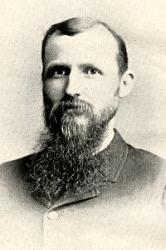Planning worship?
Check out our sister site, ZeteoSearch.org,
for 20+ additional resources related to your search.
- |
User Links
Search Results
Lost within sight of home
Author: Lanta Wilson Smith Appears in 2 hymnals Hymnal Title: Perfect Praise First Line: Wrecked where the foaming breakers Used With Tune: [Wrecked where the foaming breakers]
Lost within sight of home
[Wrecked where the foaming breakers]
Appears in 1 hymnal Composer and/or Arranger: D. E. Dortch Hymnal Title: Perfect Praise Incipit: 55556 53333 44355 Used With Text: Lost within sight of home
[Wrecked where the foaming breakers]
Lost within sight of shore
Author: Lanta Wilson Smith Hymnal: In His Name #d152 (1916) Hymnal Title: In His Name First Line: Wrecked where the foaming breakers Languages: English
Lost within sight of shore
Lost within sight of home
Author: Lanta Wilson Smith Hymnal: Perfect Praise #4 (1905) Hymnal Title: Perfect Praise First Line: Wrecked where the foaming breakers Languages: English Tune Title: [Wrecked where the foaming breakers]
Lost within sight of home
Lanta Wilson Smith
1856 - 1939 Hymnal Title: Perfect Praise Author of "Lost within sight of home" in Perfect Praise Lanta Wilson Smith was born July 19, 1856 at Castine, Maine, and died October 19, 1939 at Taunton, Massachusetts. She was the daughter of a Methodist minister, William J. Wilson, and his wife Sedelia Follett. Her father belonged to the Maine, and later the East Maine Conferences from 1846 until 1866, when he with his family traveled in a covered wagon to the west, where he served as minister in Nebraska and Dakota. Later he returned to New England and founded out his sixty-four years in the ministry at an appointment in Hingham, Massachusetts. From her early childhood Lanta sang and played the organ in church and Sunday school wherever her father was located. When seventeen she attended Bucksport Seminary, Maine, where she received some instruction in music, and where she began to write stories for the church papers. When David C. Cook introduced music and hymns into his publications, Lanta began to write hymns, some of which were used by him. She received assistance from such prominent composers as T. Martin Towne and E. O. Excell. "Scatter Sunshine" [see link below] was perhaps her most popular hymn. It was set to music by Mr. Excell and became such a favorite that he wrote her, "My, my, how I wish you would write another hymn like that. It has proved such a success that I believe I will send you a draft for twenty-five dollars to let you know how much I appreciate the hymn. Possibly this will inspire you to write another equally as good." Mrs. T. M. Towne attended the Christian Endeavor Convention in Washington in 1896, and after her return she wrote Mrs. Smith: "It's wonderful how the great chorus sang your hymn "Scatter Sunshine". A missionary in Japan asked, "May I not have, in your handwriting and over your signature, your beautiful hymn "Scatter Sunshine"? The possession and care of such a kindly souvenir of yourself will often cause me to remember you with gratiude and bring to kindly remembrance the brightness your message has brought to many a life." This request was complied with. The hymn has been adopted as the official hymn of the National Sunshine Society. Shortly after the convention just referred to Mr. Towne sent her a subject - Heaven - and insisted that the last line of the chorus should be "Is Jesus high over them all?" She writes, - "To build up a verse to match a last line beginning with "Is" was something new, and he wanted it in a hurry." When he wrote back he said "Hurrah, I knew you could do it." Asa Hull was another voluminous composer for whom she wrote hymns.
In 1880 Miss Wilson married Rev. C. Hartley Smith, and for twelve years they preached and ministered in Dakota. Both were musicians, and wherever they made calls, they were ask to sing some of the beloved hymns of the church. On returning east Mr. Smith joined the New England Southern Conference, and completed thirty-seven years of preaching. Mrs. Smith wrote more than five hundred poems, articles and hymns, the greater part of this number being hymns. Her songs were written for many occasions, Children's Day, Christmas and Easter; there were also temperance hymns and three cantatas. Of one of her songs, "The saints shall have dominion in the morning", Professor Black thought she was giving the saints too much, but when she sent him a large sheet of paper filled with Bible references to the saints, he replied, "I give up. The saints are in for a pretty good time." She left her singing voice out on the prairie, but continued to write even to her eightieth year.
--http://heirloomsreunited.blogspot.com/2010/11/, posting a scan of her biography originally published in The Choir Herald, vol.50, n.6 (March 1947): 150-151.
Lanta Wilson Smith
D. E. Dortch

1851 - 1928 Hymnal Title: Perfect Praise Composer of "[Wrecked where the foaming breakers]" in Perfect Praise Born: March 5, 1851, Theta, Tennessee.
Died: November 9/11, 1928, Tennessee.
Buried: Rose Hill Cemetery, Columbia, Tennessee.
Dortch was teaching music in Maury, Tennessee, in 1880, and was working as an evangelist by 1886. His works include:
Tidings of Joy (Columbia, Tennessee: 1878)
National Tidings of Joy (Nashville, Tennessee: National Baptist Convention of America, 1878)
Gospel Melodies, with William Dale & Charles Pollock (Nashville, Tennessee: Cumberland Presbyterian Publishing House, 1890)
Spirit and Life, with Edmund Lorenz (Dayton, Ohio: Christian Publishing Association, 1893)
Choice Songs (Nashville, Tennessee: National Baptist Convention of America, 1894)
Gospel Voices (Nashville, Tennessee: South-Western Publishing House, 1895)
Gospel Voices No. 3 (Columbia, Tennessee: David E. Dortch, 1902)
Hymns of Victory, Parts 1 and 2 (Columbia, Tennessee: Dortch Publishing Company, 1905)
Happy Greetings to All (Charlotte, North Carolina: Dortch Publishing Company, 1916)
© Cyber Hymnal™ (www.hymntime.com/tch)
D. E. Dortch


 My Starred Hymns
My Starred Hymns


